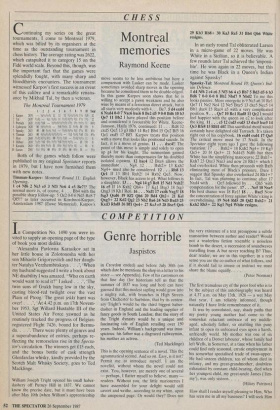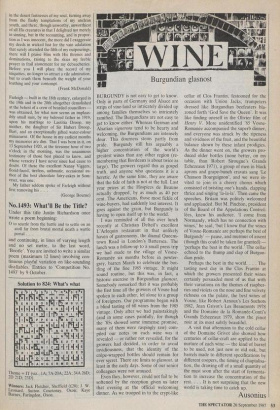COMPETITION
Genre horrible
Jaspistos
In Competition No. 1490 you were in- vited to supply an opening page of the type of book you most dislike.
`Alexandra Pavlovna Karasikov sat in her little house in Zolotonosha with her son Mihaelo Grigoryevitch and her daugh- ter Natalya Verzhembitskaya . . .', 'When my husband suggested I write a book about NE disability I was amazed. "Who on earth would want to read it?" I asked . . .', 'The twin suns of Grakh hung low in the sky, casting blood-red twilight over the vast Plain of Ptoog. The great jekki hunt was over! . . .', 'At 4.42 p.m. on 17th Novem- ber 1953, Sgt Willard Huxtable III. of the United States Air Force yawned as he routinely tracked the progress of Belgian- registered Flight 7426, bound for Bermu- da. . . .'. There were plenty of genres and a superabundance of entries, perhaps re- flecting the remorseless rise in the Specta- tor's circulation. The winners get £15 each, and the bonus bottle of cask strength Glenfarclas whisky, kindly provided by the Scotch Malt Whisky Society, goes to Ted Macklinge.
William Joseph Tright opened his small haber- dashery off Putney Hill in 1837. We cannot know the precise date, but it must have been after May 10th (when William's apprenticeship
in Croydon ended) and before July 30th (on which date he mentions the shop in a letter to his sister — see Appendix). Few of his customers on that fine day (for historians tell us that the summer of 1837 was long and hot) can have guessed that this modest sapling would grow into a mighty oak, with branches in High Streets from Chichester to Surbiton, that by its centen- ary Tright's would be the third biggest haber- dasher in England and the leading supplier of fancy goods in South London; that the story of the Tright dynasty would be a unique and fascinating tale of English retailing over 150 years. Indeed, William's background was inau- spicious: his father was a disgraced railwayman, his mother an actress.. . .
(Ted Macklinge)
This is the opening sentence of a novel. This the agrammatical second. And so on. Easy, is it not? Permit me to introduce myself. I am the novelist, without whom the novel could not exist. You, however, are merely one of several — perhaps, I flatter myself to believe, many readers. Without you, the little marionettes I have assembled for your delight would still cavort and writhe, according to my whim, upon the unopened page. Or would they? Does not the very existence of a text presuppose a subtle transaction between author and reader? Would not a readerless fiction resemble a noiseless bomb in the desert, a succession of soundwaves travelling from A but never reaching B? Thus, dear reader, we are in this together; in a real sense you are the co-author of what follows, and if it should fail to amuse or instruct we must share the blame equally.. . .
(Peter Norman) The first tremulous cry of the poor fool who is to be the subject of this autobiography was heard at 4.37 a.m. on May 13th, 1928 — a wet May that year, I am reliably informed, though naturally I have little remembrance of it.
It was by convoluted, nay, shady paths that my pretty young mother had come to the somewhat reluctant embrace of my middle- aged, 'scholarly father, so enabling this puny infant to open its unfocused eyes upon a harsh, unfriendly world. My mother was one of six children of a Dorset labourer, whose family had left Wells, in Somerset, at a time when his father could find only seasonal, erratic employment in his somewhat specialised trade of swan-upper. He had sixteen children, ten of whom died in infancy, and my great-grandmother, doubtless exhausted by constant child-bearing, died when her youngest child, my great-uncle James ('Jim- my'), was only sixteen. . . .
(Hilary Patrinos) How shall I render myself pleasing to Him. Who has seen me in all my'baseness? I will seek Him in the desert fastnesses of my soul, turning away from the flashy temptations of my unclean youth, and there, though unworthy, unworthiest of all His creatures in that I delighted not merely in sinning, but in the recounting, and in propor- tion as I was innocent, the more did I exaggerate my deeds in wicked lust for the vain adulation that surely attended the filth of my outpourings, there will I praise Him with His thrones and dominations, raising to the skies my feeble prayer in frail atonement for my debaucheries. Before you I will place the record of my iniquities, no longer to attract a vile admiration, but to crush them beneath the weight of your loathing and your contempt.
(Frank McDonald) Farleigh — built in the 18th century, enlarged in the 19th and in the 20th altogether demolished at the behest of a crew of bearded councillors was obtained, for what now seems an implaus- ibly small sum, by my beloved father in 1919, upon his marriage to Laetitia Droop, my mother, the daughter of Sir Hubert Droop, Bart, and an exceptionally gifted water-colour miniaturist. Of the house in my earliest months my memories are dim. That I was born in it, on 13 September 1920, at the tiresome hour of two o'clock in the morning, was the unanimous testimony of those best placed to know, and whose veracity I have never since had cause to doubt. Of these the excellent Nanny Viggers, florid-faced, tireless, asthmatic, occasional au- thor of the best chocolate fairy-cakes in Som- erset, was one.
My father seldom spoke of Farleigh without first removing his . . .
(George Bourne)































































 Previous page
Previous page